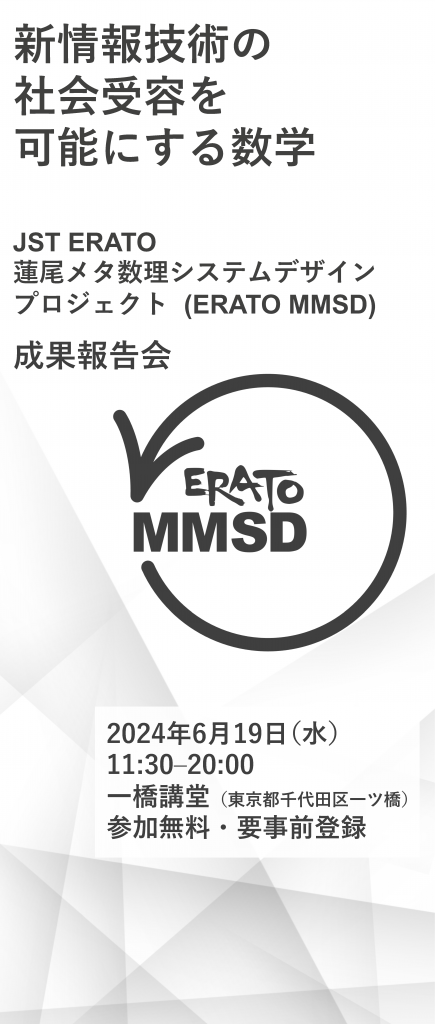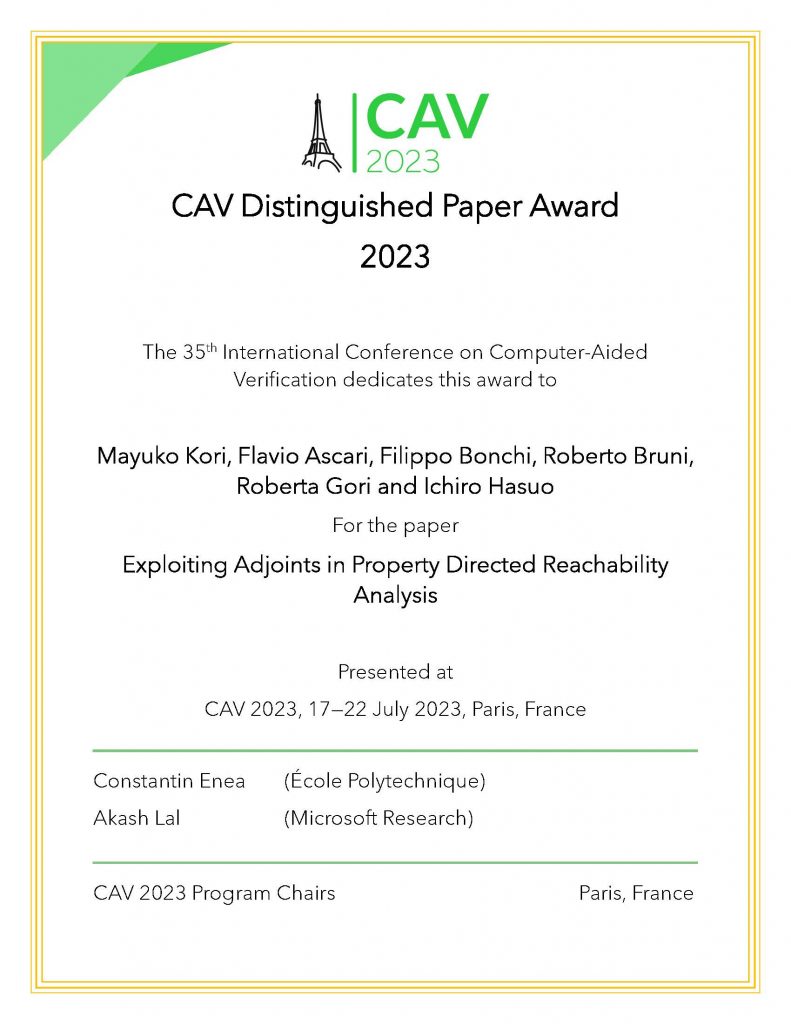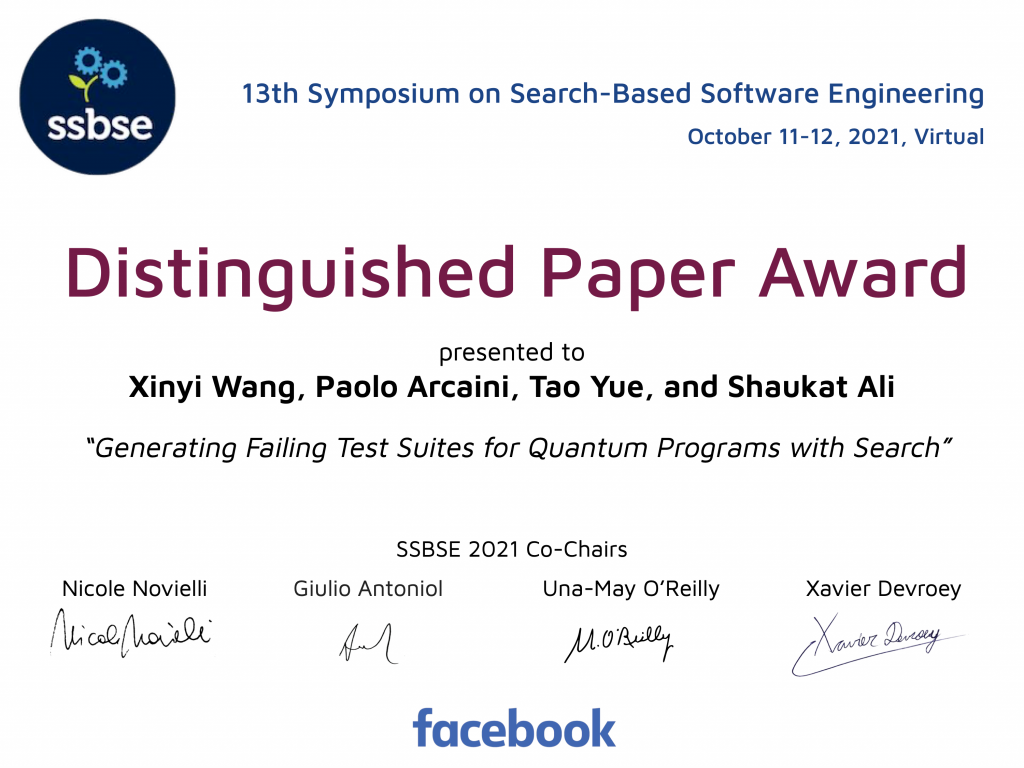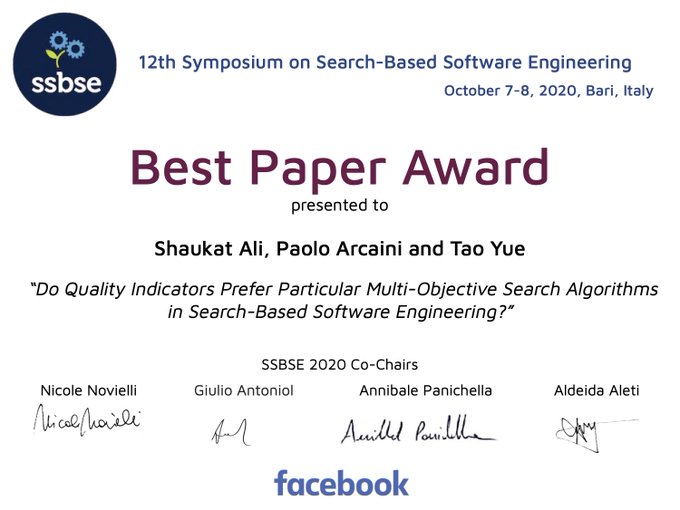Symposium information: https://group-mmm.org/eratommsd/ja/2024symposium/
Most talks are in Japanese… but join us for poster presentations and discussions! Registration deadline: Fri 7 June.

Symposium information: https://group-mmm.org/eratommsd/ja/2024symposium/
Most talks are in Japanese… but join us for poster presentations and discussions! Registration deadline: Fri 7 June.

A paper by Mayuko Kori, Ichiro Hasuo and others was awarded as Distinguished Paper Award of 35th International Conference on Computer Aided Verification.
Authors
Mayuko Kori (National Institute of Informatics & SOKENDAI)
Flavio Ascari (University of Pisa)
Filippo Bonchi (University of Pisa)
Roberto Bruni (University of Pisa)
Roberta Gori (University of Pisa)
Ichiro Hasuo (National Institute of Informatics & SOKENDAI)
Awarded Paper Title
Exploiting Adjoints in Property Directed Reachability Analysis

Mayuko Kori is a PhD student at SOKENDAI/NII, a JSPS Research Fellow (DC), and a research assistant at ERATO MMSD (Group 0).
Three papers (co)-authored by ERATO MMSD researchers accepted for presentation at CAV 2023 – 35th International Conference on Computer Aided Verification.
The CAV Conference is a top international venue on computer-aided formal analysis methods for hardware and software systems. CAV 2023 will take place in Paris, Frande, in July 2023.
A few positions with us are now open:
Besides, there is a post-doc opportunity open in Kyoto, in Atsushi Igarashi’s group (we work closely with them):
A news release from NII and JST:
The research team led by HASUO Ichiro at the National Institute of Informatics (NII, Japan) developed a methodology to provide strong mathematical safety guarantees to automated driving vehicles, together with its underlying theory on formal logic. This research was conducted under the ERATO MMSD project funded by the Japan Science and Technology Agency (JST, Japan).
Building on the existing methodology called “Responsibility-Sensitive Safety (RSS)” for mathematical proofs of automated driving safety, the research established its extension called “Goal-Aware RSS (GA-RSS)” that expands RSS’s application domain to a variety of real-world driving scenarios. Specifically, the techniques in GA-RSS derived from theoretical results in formal logic enable one to provide mathematical safety proofs to more complex driving scenarios than before, especially those which require achievement of certain goals such as an emergency stop.
The outcome of this research was published in IEEE Transactions on Intelligent Vehicles, a top journal on automated driving on July 5, 2022 (US Eastern Time).
The following positions are currently open.
New method for automatic and efficient discovery of reliable gas turbine system designs
— Exploiting the logical specification in black box optimization and applying it to the design process of real commercial products — A research team consisting mainly of SATO Sota and HASUO Ichiro at the National Institute of Informatics (NII, Japan) and the Graduate University for Advanced Studies (SOKENDAI, Japan), developed a method for automatically finding gas turbine control system designs that satisfy multiple requirements, with collaboration of Mitsubishi Heavy Industries, Ltd.
Automatic control system design methods have not hitherto been able to discover controllers of comparable quality to those designed by human experts. But with the new method developed by this research team, it is now possible to find controllers with comparable quality to the results obtained manually by human experts, based on fully automatic computation. This method is generally applicable to “black box” control systems whose internal behavior cannot be described by models such as mathematical formulas. The method is expected to be useful in design processes in various fields such as autonomous driving.
This research was conducted under the ERATO MMSD Project(*1) funded by the Japan Science and Technology Agency (JST, Japan). The results of this research will be presented online on November 24, 2021 (Chinese Standard Time) at the 24th International Formal Methods Symposium (FM’21).
Dr. Paolo Arcaini has been awarded the Distinguished paper award at SSBSE 2021 — 13th Symposium on Search-Based Software Engineering
Xinyi Wang, Paolo Arcaini, Tao Yue, Shaukat Ali
Generating Failing Test Suites for Quantum Programs With Search
Dr. Paolo Arcaini is a Project Associate Professor at NII, and the leader of ERATO MMSD Project, Group 3.

A team consisting of Ezequiel Castellano, Ahmet Cetinkaya, Cédric Ho Thanh, Stefan Klikovits, Xiaoyi Zhang, and Paolo Arcaini, submitted the Frenetic tool to the CPS testing competition of SBST 2021 which showed good results in terms of diversity and failure generation rate.
The competition focused on the scenario generation for testing the lane-keeping capabilities of an autonomous driving system, using the BeamNG simulator. The goal was to generate virtual roads that lead to lane-keeping failures (a.k.a. OBEs, for Out-of-Bounds-Errors) within a certain time frame. The submitted tools competed in two distinct configurations, differing in time budget, vehicle configuration, and OBE tolerance.
Frenetic is a genetic approach that leverages a curvature-based road representation, and introduces some nuances aiming at improving diversity of the generated roads.
Implementations were not ranked, but the competition report (in print) states that Frenetic is generally “very effective and triggered many failures“. In fact, Frenetic was among the two tools that “triggered at least 10x more OBEs than the other tools for both configurations”. In particular, “Frenetic exposed the most diverse set of failures on average” and found ”the highest number of OBEs for which the ego-car invades the opposite traffic lane”, which might be of particular interest for car manufacturers.* The Frenetic implementation and a description of the algorithm are available in our repository.
Dr. Paolo Arcaini has been awarded the best paper award at SSBSE 2020 — 12th Symposium on Search-Based Software Engineering
Paolo Arcaini, Shaukat Ali, Tao Yue:
Do Quality Indicators Prefer Particular Multi-objective Search Algorithms in Search-Based Software Engineering?
Dr. Paolo Arcaini is a Project Associate Professor at NII, and the leader of ERATO MMSD Project, Group 3.
